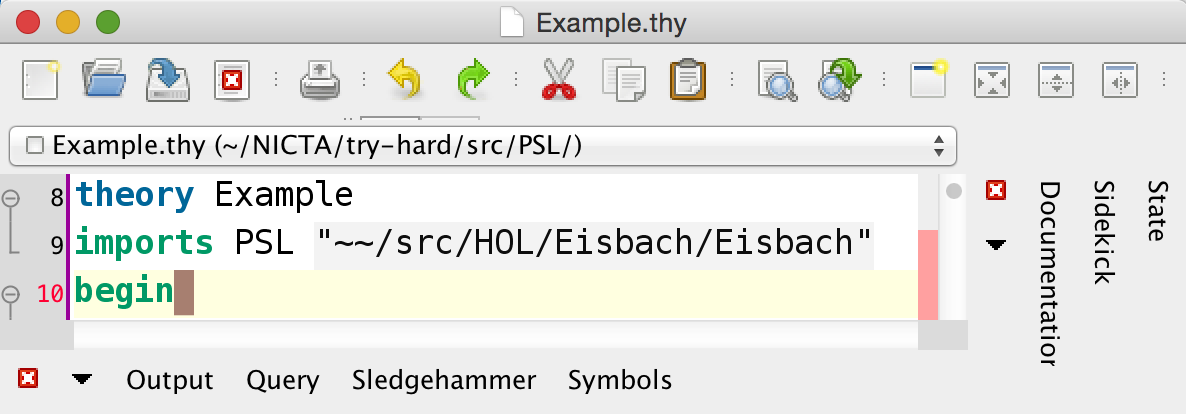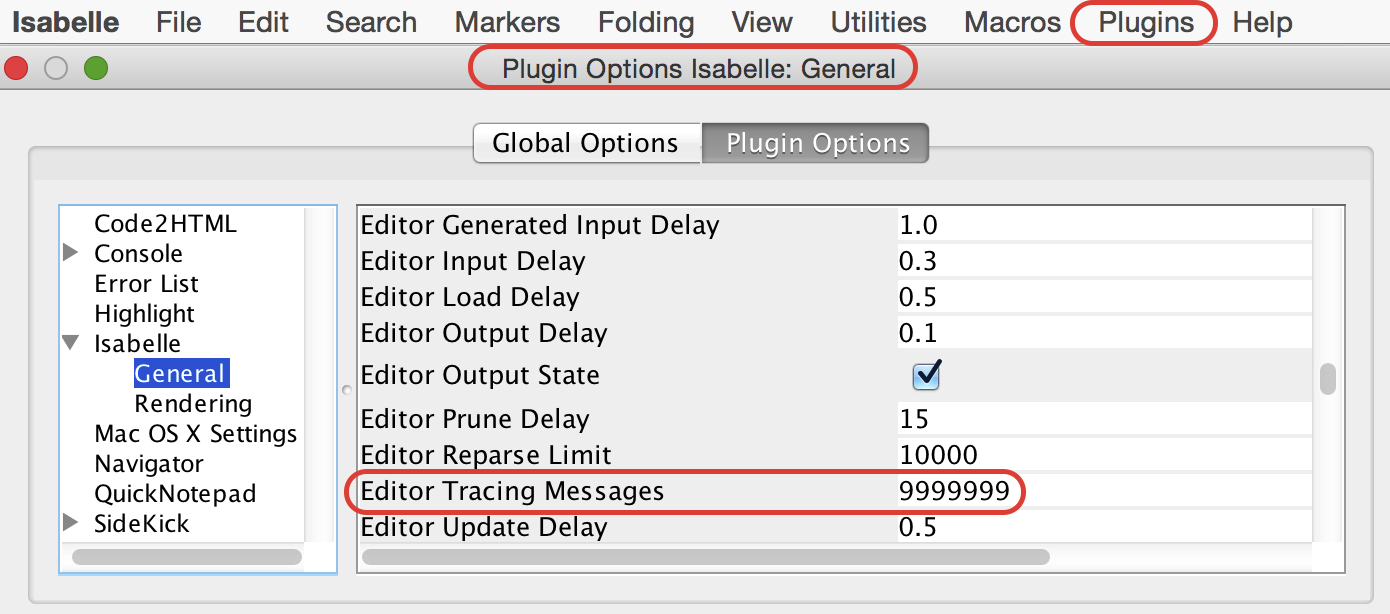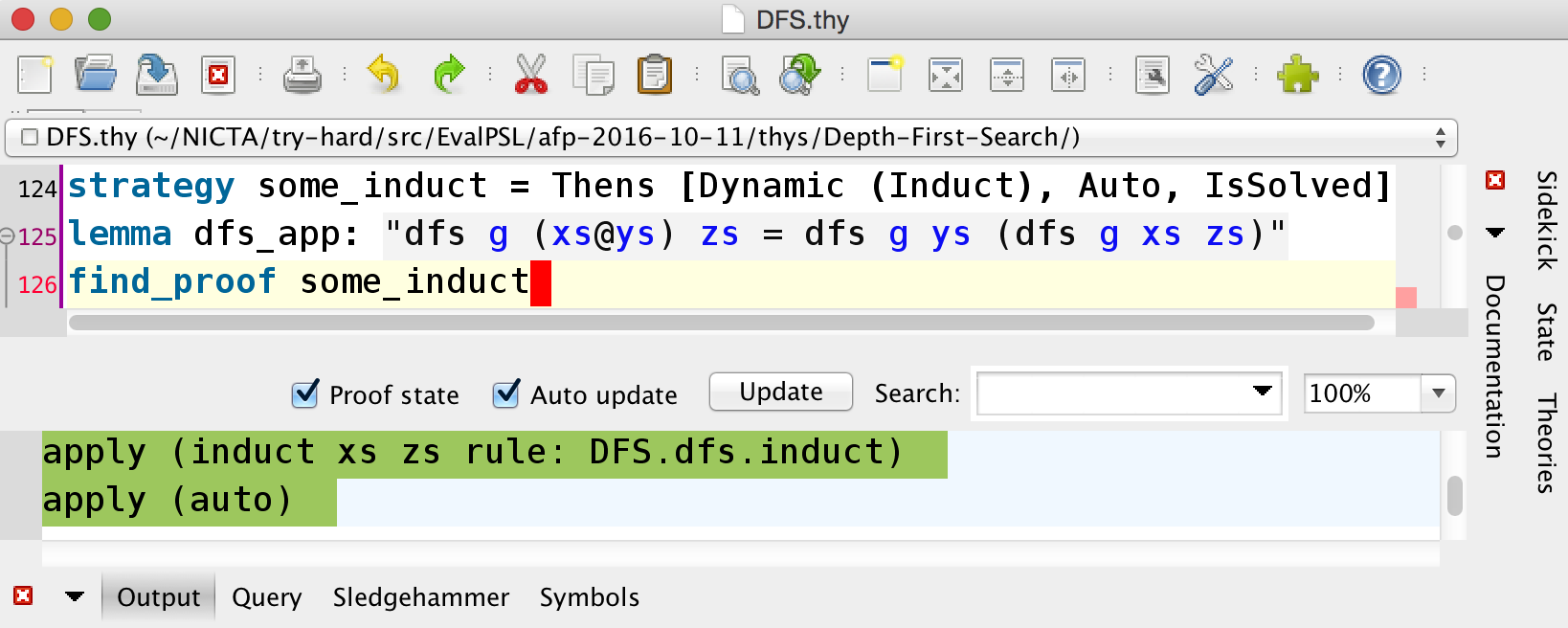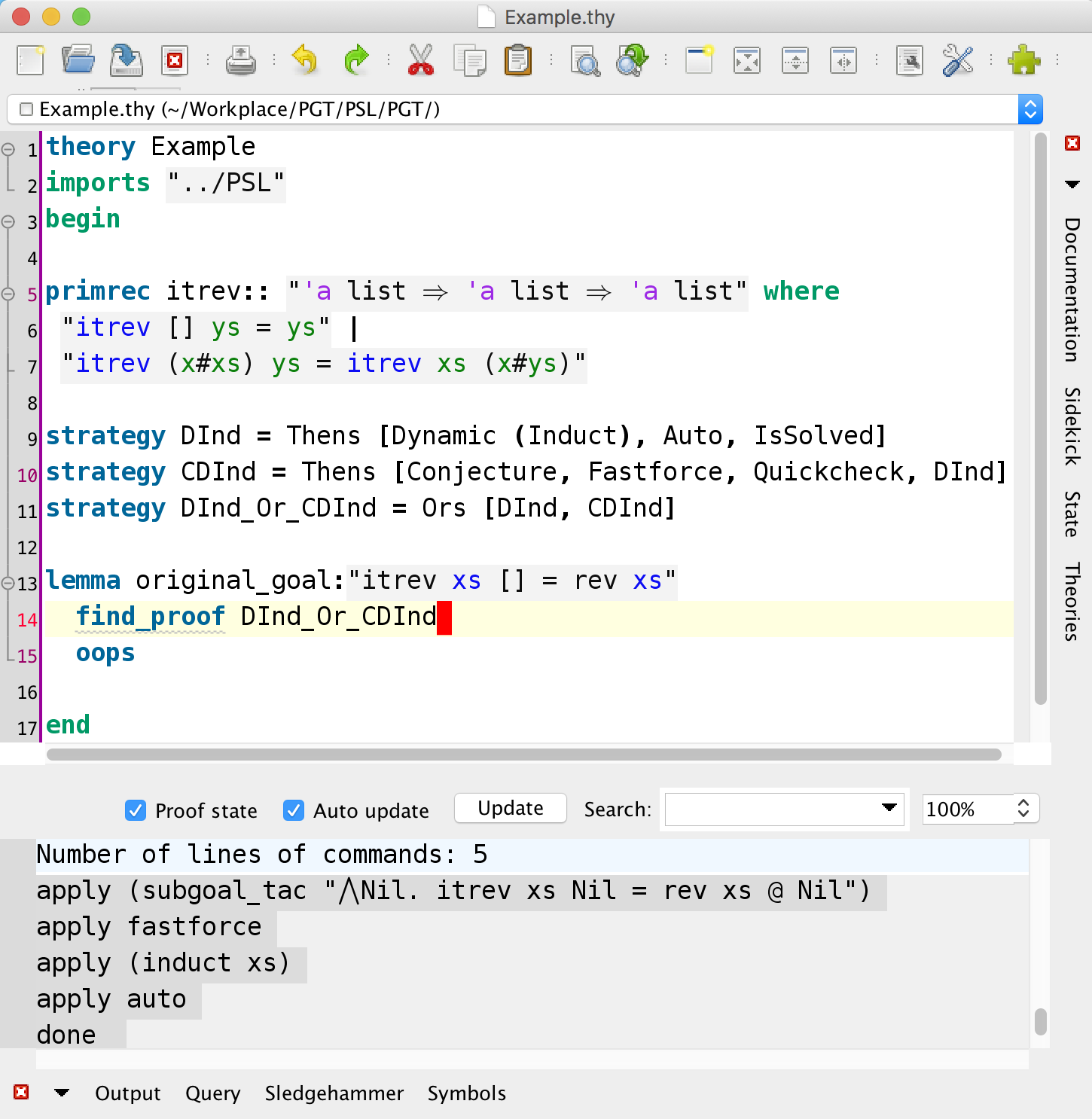- This branch is under active development. Please use release v0.1.1 PSL with PGT: CICM2018 for Isabelle2017, which is the latest stable version.
- Please import PaMpeR/PaMpeR.thy to your theory file to elicit recommendations from PaMpeR.
- More information about PaMpeR is provided in PSL/PaMpeR/README.md.
This repository contains the implementation of proof strategy language (PSL) and its default strategy, try_hard, for Isabelle2017. Note that Isabelle2016 and Isabelle2016-1 are no longer supported.
- Install Isabelle2017.
- Download or clone this repository (git clone https://github.com/data61/PSL.git).
- Then, Users can install PSL and try_hard by importing .PSL.thy to their theory files
with the Isabelle keyword, imports.

- The keyword strategy defines a new strategy.
- The keyword find_proof invokes PLS's runtime system searching for a proof based on a given strategy.
- The keyword try_hard searches for a proof based on the default strategy. Upon success, it discharges the first sub-goal or all the sub-goals in a given proof obligation.
- The keyword try_hard_one is similar to try_hard, but focuses only on the first sub-goal.
- The keyword try_hard_all is similar to try_hard, but tries to discharge all sub-goals.
- The keyword try_parallel is similar to try_hard, but exploits parallelism.
PSL's runtime tactic generation can result in a large number of messages in Isabelle/jEdit's output panel. This might cause Isabelle/jEdit to pause PSL's proof search after reaching its default upper limit for tracing messages.
- One can circumvent this situation by changing the upper limit to an extreamly large number, say 99999999.
- One can change the upper limit for tracing messages via jEdit's menus:
Plugin Options => Isabelle => General => Editor Reactivity => Editor Tracing Messages.

- .src/Utils.ML includes various utility functions.
- .src/Subtool.ML treats Isabelle's subtools as state-monad tactics.
- .src/Dynamic_Tactic_Generation.ML facilitates runtime tactic generation.
- .src/Constructor_Class.ML/ is a general purpose constructor class library.
- .src/Instantiation.ML instantiates some type constructors as members of constructor classes.
- .src/Monadic_Prover.ML contains the interpreter of PSL.
- .src/Parser_Combinator.ML contains general purpose monadic parser combinators.
- .src/PSL_Parser.ML defines the PSL parser.
- .src/Isar_Interface.thy sets up the Isabelle/Isar interface for PSL.
- .src/Try_Hard.thy defines the default strategy try_hard.
- ./PSL.thy reads all the necessary files to use PSL and try_hard.
- ./Example presents small example strategies and use cases.
Q1. Why yet another tactic language? How is PSL different from, say, Eisbach?
A1. PSL’s runtime system attempts to generate efficient proof scripts from a given strategy by searching for the appropriate specialisation and combination of tactics for a particular conjecture without direct user interaction. Eisbach does not generate methods dynamically, trace proof attempts, nor support parallelism natively. Eisbach is good when engineers already know how to prove their conjecture in Isabelle, while PSL is good when they want to find out how to prove it.
Q2. To be honest, I do not have time to learn a new language. Can I still use PSL without learning its syntax?
A2. We made PSL’s syntax similar to that of Isabelle’s tactic language to lower the learning barrier of PSL. But if you do not feel writing your custom strategy, enter try_hard. It invokes the default strategy, TryHard. The lack of input from human engineers on the proof obligation at hand makes the TryHard less specific to each conjecture; however, we made try hard more powerful than existing proof automation tools for Isabelle by specifying larger search spaces.
Q3. How much computational resources do I need to use PSL / try_hard?
A3. The more is the better. You can increase the power of your strategy by using parallel combinators, such as POrs and PAlts.
Q4. It looks like PSL's proof search got stuck due to the high volume of traing messages. How can I keep it running?
A4. You can change the upper limit for tracing messages via jEdit's menus: Plugin Options => Isabelle => General => Editor Reactivity => Editor Tracing Messages.
Q5. try_hard keeps running for more than five minutes. How long should I wait to get a proof for this conjecture?
A5. It depends on how difficult your conjecture is. try_hard starts with simple proof strategies that usually do not take much time and tries more time consuming strategies if simple strategies cannot find a proof. If it keeps running for more than six hours, I would start writing proofs manually.
Q6. Why try_hard? Why not sledgehammer?
A6. sledgehammer is good when you want to get a proof quickly, while try_hard is good when you have a longer time for proof search. Our evaluation shows that given 300 seconds of time-out for each proof goal try_hard solves 1115 proof goals out of 1526, while sledgehammer found proofs for 901 of them using the same computational resources and re-constructed proofs in Isabelle for 866 of them. This is a 14 percentage point improvement of proof search and a 16 percentage point increase for proof reconstruction. Moreover, 299 goals (20% of all goals) were solved only by try_hard within 300 seconds. try_hard is especially good at discharging proof obligations that can be nicely handled by by a) mathematical (co)induction, b) general simplification rules, or c) specialised tactics.
Q7. What are Generalize and Conjecture? Which proof methods will PSL generate for these atomic strategies?
A7. Generalize and Conjecture are new additions to PSL's atomic proof strategies. Given a proof obligation, Generalize attempts to create conjectures by generalizing the proof obligation in various ways and insert each of them as a subgoal of the original proof obligation. Conjecture works similarly to Generalize; However, Conjecture also tries to mutate the original proof obligation as well as generalization of the original obligation. Generalize and Conjecture are still experimental, and we do not have an evaulation results. The example file (PGT/Example.thy) contains an example of how it works. We attached a screenshot of this file in the following. For more details, please find our tool paper accepted at 11th Conference on Intelligent Computer Mathematics (CICM2018).
For more details, please read the paper A Proof Strategy Language and Proof Script Generation for Isabelle/HOL available at arXiv.org.

